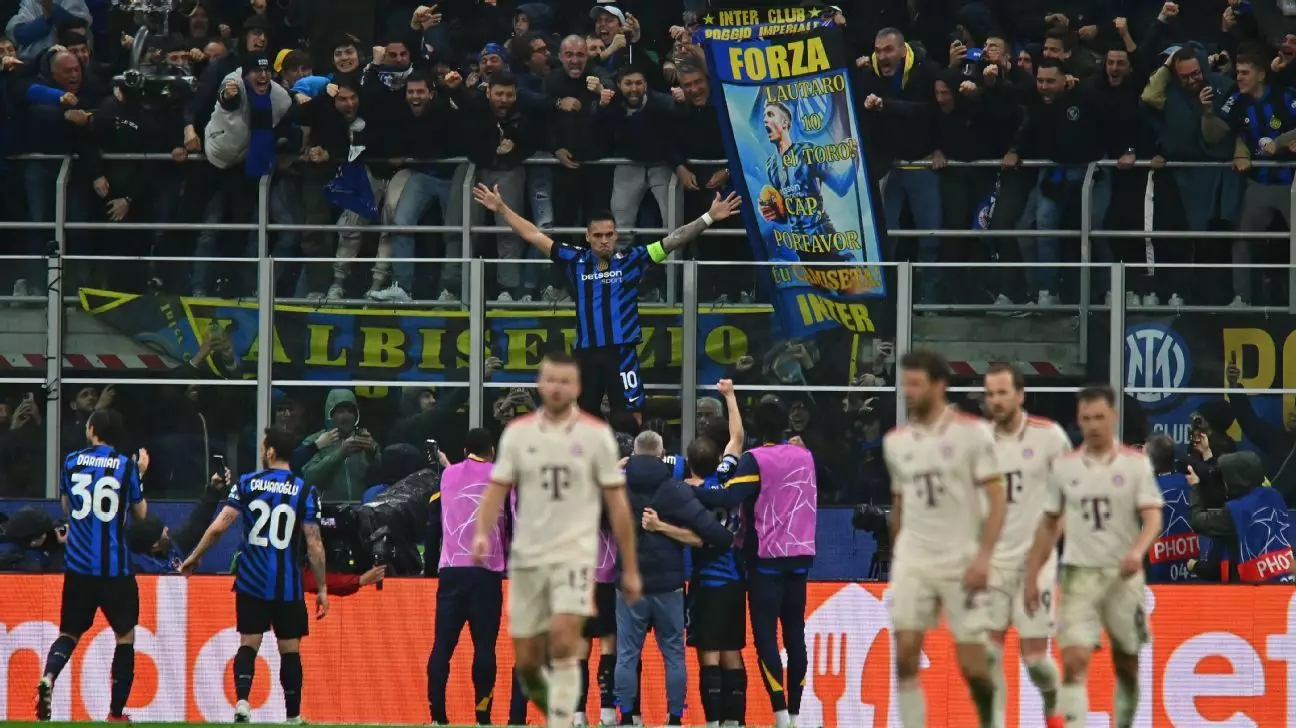Internazionale’s recent journey into the UEFA Champions League semifinals embodies a double-edged sword, reflecting both commendable determination and unsettling caution. The team managed a 2-2 draw against Bayern Munich, successfully advancing with a 4-3 aggregate score. Though elation surrounds their progress, the circumstances that necessitated such a hard-fought battle raise significant questions about their strategic approach and future sustainability in high-stakes matches. It’s all too easy to celebrate advancement; however, the undercurrents of tension that underpinned this game reveal a team grappling with self-doubt, particularly under pressure.
Tactical Missteps and Defensive Mindset
Head coach Simone Inzaghi must now navigate the thin line between satisfaction and forthcoming scrutiny. While it’s essential to acknowledge the tactical acumen that allowed Inter to seize the moment, the way they retreated into their shell after gaining a comfortable lead exposes a fundamental flaw in their game plan. Upon accruing a lead—especially against a team like Bayern, even one suffering from injuries—Inter should have adopted a more assertive strategy rather than inviting relentless pressure. The shift in mentality towards a defensive posture not only stifles their attacking prowess but also risks inviting more danger from opponents eager to capitalize on any sign of vulnerability.
At the pivotal moment when Benjamin Pavard put Inter up 2-1 in the match, the game was theirs to manage. Under normal circumstances, with Bayern missing key players like Jamal Musiala and Alphonso Davies, this was the opportunity to seize control thoroughly. Instead, the numbers tell a different story: Bayern ended that match with a staggering shot count of 8-2 and an expected goals (xG) advantage of 0.58 to 0.10. This disparity illustrates the disconnect between possession management and defensive capitulation—something that should concern any coach, especially one in charge of a team competing at the highest levels of European football.
Lessons Lost
With the winds of San Siro swirling and the rain pouring down, the conditions were undeniably challenging. However, this reality applied equally to both teams. When teams merely survive instead of thrive, the myths of favorable weather become an excuse rather than a reason. Inter’s hesitant approach led to foreseeable consequences, including Eric Dier’s equalizer—an embodiment of the classic blunder of showing an opponent too much respect. The earlier confidence displayed by Inter was replaced by a defensive shell that signaled fear rather than strategy.
Even with the substitutions intended to bolster their defense, the chaos on the field highlighted a lack of conviction. Mehdi Taremi and Alessandro Bastoni’s struggles depicted a squad perhaps weary and uncertain, floundering against the aggressive push from Bayern. Yes, fatigue at this level can be a significant motivator for a more cautious approach, but Inter should cultivate a mindset that embraces the challenge rather than shrinking from it. Their emergence as semifinalists calls for more than just defensive resilience—it should prompt a quest for identity, conviction, and a balanced approach to managing leads.
Inter’s Potential for Greatness
Despite the flaws, it’s crucial to recognize Inter’s inherent quality as a team. With a wage bill that is notably smaller compared to their rivals, their success is a testament to excellent coaching, astute player management, and a tightly knit tactical framework. Their defensive record during this Champions League season, having conceded a mere six goals and trailing for only ten minutes, marks them out as a formidable opponent. This performance pedigree should inspire confidence, not timidity, as they face tougher contests ahead, such as the looming semifinal against a Barcelona side teeming with talent.
The upcoming clash against Jordi Alba, Raphinha, and Robert Lewandowski presents a clear opportunity for Inter to recalibrate their mindset. Should they take the lead again, relying on a robust defensive strategy is insufficient. They must implement a tactics-first approach that actively seeks to exploit defensive gaps rather than barricading in anticipation of oncoming attacks. Attack not just features tactics but a state of belief that opponents can be beaten every time they step onto the field, which is crucial as they face arguably one of the most feared attacking units in Europe.
The Path Forward
Looking beyond the immediate pitfalls, Inter must evolve. A deeper understanding of their strengths and weaknesses is essential if they aspire to transcend past successes. Should the team maintain their current trajectory while infusing a self-belief in attacking potential, they may not just become semifinalists, but potential champions. A balance between celebrating victories while addressing the consequential learning moments will define their legacy. In a landscape where footballing giants clash, intermingling resolve with creativity may very well pave their pathway to glory.

